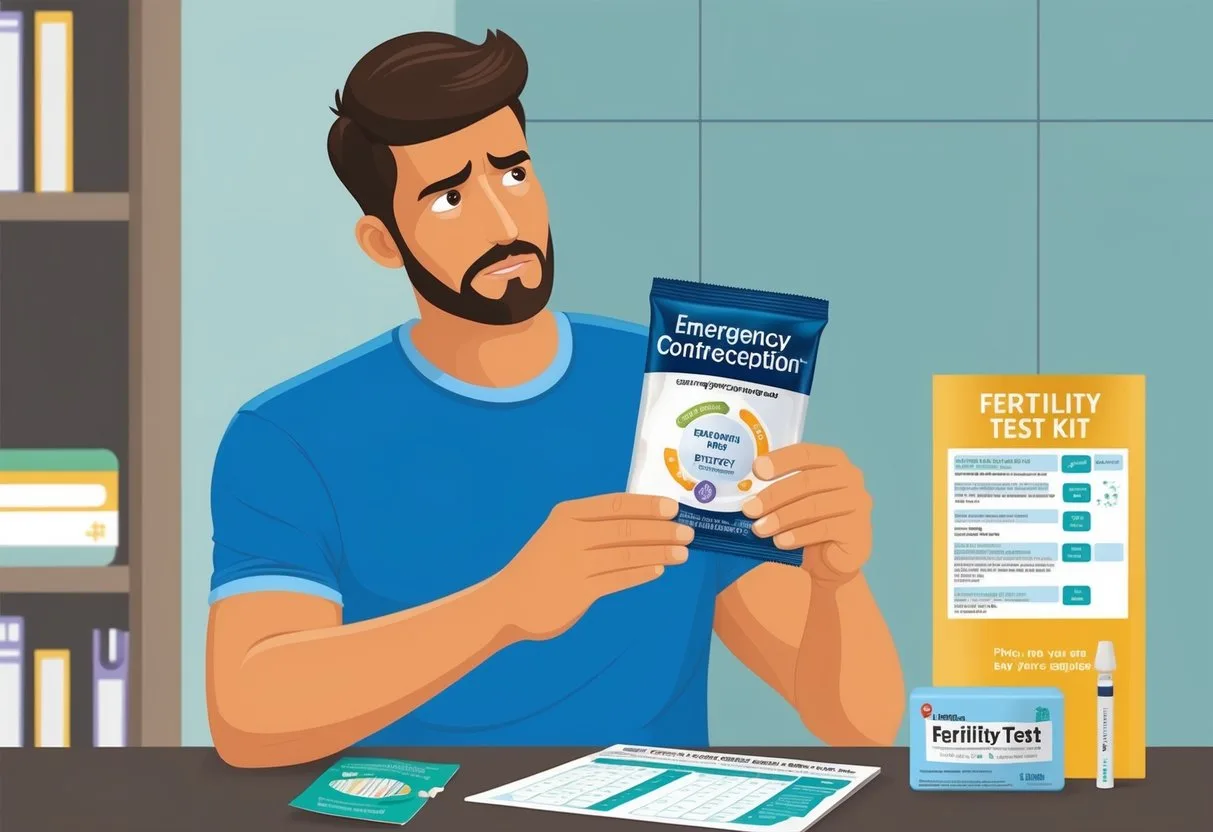Plan B is an emergency contraceptive pill that many people know about, but not everyone understands how it works. Some guys might wonder what would happen if they took Plan B by mistake or on purpose. It’s a fair question, especially since unprotected sex can lead to pregnancy scares for couples.
If a man takes Plan B, it won’t do anything to prevent pregnancy. The pill is made to work in women’s bodies, not men’s. The pill is not meant for guys to use as birth control.
The pill won’t have any lasting effects on men if they take it once or twice by accident.
While Plan B isn’t for men, scientists are working on making male birth control pills. These would be different from Plan B and work in a man’s body to lower the chance of pregnancy. For now, guys should stick to other birth control methods like condoms to prevent pregnancy after unprotected sex.
Understanding Plan B and Its Intended Use

Plan B is a type of emergency contraception for women. It works to prevent pregnancy after unprotected sex. The pill contains hormones that affect the female body in specific ways.
What Is Plan B?
Plan B is a brand name for a common emergency contraceptive pill. It’s also known as the morning-after pill. The active ingredient in Plan B is levonorgestrel, a hormone used in many birth control methods.
Plan B is available over the counter without a prescription. Women can buy it at drugstores or pharmacies. The pill comes in a single dose that should be taken as soon as possible after unprotected sex.
How Plan B Works on the Female Body
Plan B affects the female body in several ways to prevent pregnancy. Its main job is to stop or delay ovulation. This means it keeps the ovaries from releasing an egg.
The pill also makes it harder for sperm to reach an egg. It does this by thickening the mucus in the cervix. If an egg has already been fertilized, Plan B may stop it from attaching to the uterus.
Plan B does not end an existing pregnancy. It only works to prevent a new pregnancy from starting.
Intended Use of Emergency Contraceptives
Emergency contraceptives like Plan B are meant for backup birth control. They should not be used as regular contraception. Plan B is most effective when taken within 24 hours of unprotected sex.
Women might use Plan B if:
- Their regular birth control failed
- They forgot to use protection
- They were forced to have sex
Plan B can reduce the risk of pregnancy by up to 87% if taken within 3 days. But it’s not as effective as regular birth control methods used before sex.
Effects of Hormonal Contraceptives on Men

Hormonal contraceptives like Plan B can affect men’s bodies in unexpected ways. These effects stem from the powerful hormones used in birth control medications.
Hormonal Ingredients in Plan B
Plan B contains levonorgestrel, a synthetic form of progesterone. This hormone is key to how emergency contraception works in women.
In men, taking levonorgestrel may lead to temporary hormonal imbalances. The body isn’t used to high doses of this hormone.
Other birth control pills often contain estrogen and progestin. These can also impact male physiology if taken accidentally.
Potential Impact on Male Physiology
Men who take Plan B might experience short-term side effects. These can include nausea, headaches, and fatigue.
The hormone surge could briefly affect testosterone levels. This might cause mood swings or changes in sex drive.
Long-term use of hormonal contraceptives isn’t recommended for men. It could potentially disrupt normal hormone production.
Researchers are working on a male birth control pill. This would be designed specifically for male physiology. It aims to reduce sperm production without harmful side effects.
Possible Side Effects for Men

Taking Plan B as a man can lead to various side effects. These effects range from short-term discomfort to potential long-term issues.
Short-Term Side Effects
Men who take Plan B may feel nauseous or have stomach pain. This happens because the pill contains high doses of hormones not meant for male bodies.
Headaches and dizziness are also common. Some guys might feel tired or have trouble sleeping after taking the pill.
In rare cases, men could experience vomiting. This is more likely if they take the pill on an empty stomach.
Mood changes are possible too. A guy might feel irritable or anxious for a short time after taking Plan B.
Long-Term Side Effects
The long-term effects of men taking Plan B are not well-studied. However, repeated use might cause some issues.
There’s a chance it could affect a man’s libido or sex drive. The hormones in the pill might temporarily lower testosterone levels.
Weight changes are possible but not common. Some men might notice slight weight gain or loss.
It’s important to note that Plan B won’t cause infertility in men. The pill doesn’t have lasting effects on sperm production or quality.
Spotting or unusual bleeding is not a concern for men, as they don’t have menstrual cycles.
Emergency Contraception and Male Fertility

Plan B is meant for women, not men. Taking it won’t help prevent pregnancy if a man uses it. Let’s look at how emergency contraception relates to male fertility and reproductive health.
Can Plan B Affect Male Fertility?
Plan B contains levonorgestrel, a hormone that works in women’s bodies. If a man takes Plan B, it likely won’t harm his fertility. The pill is designed for female biology and doesn’t impact sperm or male reproductive organs.
Men don’t have a similar “morning after” option. Plan B doesn’t stop sperm production or function in males. A man taking it by mistake probably won’t see any effects on his ability to father children.
For pregnancy prevention, men should use condoms or talk to a doctor about long-term birth control options.
Understanding Male Reproductive Health
Men’s fertility depends on making healthy sperm. Good overall health supports this. Exercise, a balanced diet, and avoiding smoking help sperm quality.
Male fertility issues can include:
- Low sperm count
- Poor sperm movement
- Abnormal sperm shape
These may be caused by genetics, health problems, or lifestyle factors. Regular check-ups can catch problems early.
Male contraception options are limited but important. Condoms prevent both pregnancy and STDs. Some men choose vasectomy for permanent birth control.
Male Health Considerations and Contraceptive Use
Men should be aware of safe and effective birth control options. Talking to a doctor can help guys make smart choices about contraception. There are also some male-specific methods to prevent pregnancy.
Consulting a Health Professional
Guys who want to learn about birth control should talk to a doctor. An ob-gyn or medical professional can give advice on contraceptives that work for men. They can explain how different methods prevent pregnancy.
Doctors can also check for any health issues that might affect birth control use. This helps make sure the chosen method is safe.
Some key things to discuss with a doctor include:
• Sexual health history • Current medications • Allergies • Future family planning goals
A doctor can answer questions and clear up myths about male contraception too.
Alternative Male Contraceptives
Men have several birth control options besides taking pills meant for women. Condoms are a common and effective choice. They stop sperm from reaching an egg and can prevent STDs too.
Other male contraceptive methods include:
• Withdrawal (pulling out) • Vasectomy surgery • Male birth control pills (in development)
Condoms are easy to get and use. Guys can buy them at many stores without a prescription. Vasectomies are a permanent option for men who don’t want kids. New types of male birth control are being tested but aren’t available yet.
Legal and Age-Related Aspects of Plan B Access

Plan B is available without a prescription in many places. Age and ID requirements have changed over time. Some rules differ between states and pharmacies.
Proof of Age for Plan B Purchase
Anyone can buy Plan B without showing ID. In the past, you needed to be 17 or older to get it. Now there’s no age limit.
Teens don’t need a parent with them to buy Plan B. They can get it on their own at a drugstore. Some stores keep it behind the counter or in a locked case. A customer might need to ask for help to get the product.
Even without ID checks, Plan B can cost $11-$50. This price may be hard for some teens to afford.
Regulations on Emergency Contraceptives
Plan B is a type of emergency contraceptive. It’s not the same as abortion pills. The Supreme Court said Plan B is still legal after overturning Roe v. Wade.
But some states have unclear laws. This causes confusion about Plan B’s legality in certain places. Most areas allow its sale without limits.
Other types of emergency contraception exist too. For example, ella needs a prescription. A doctor or Planned Parenthood can help get these options.
Plan B Myths vs. Facts
Plan B is surrounded by many myths. Let’s separate fact from fiction and look at the correct information for safe use.
Debunking Common Myths
Many people think Plan B is an abortion pill. This is not true. Plan B works by stopping ovulation. It won’t harm an existing pregnancy.
Some believe Plan B is only for young women. In fact, it’s safe for women of all ages.
A common myth is that Plan B affects future fertility. Research shows it has no long-term impact on the ability to get pregnant later.
People often think Plan B is 100% effective. While very good, it’s not perfect. It works best when taken quickly after unprotected sex.
Accurate Information for Safe Use
Plan B is most effective within 24 hours of unprotected sex. It can work up to 72 hours after, but its success rate drops over time.
The pill is easy to use. It’s just one dose. Side effects are usually mild, like nausea or changes in the next period.
Plan B does not protect against STIs. It’s for emergency use only, not regular birth control.
Women can take Plan B more than once in a cycle if needed. But it’s not as effective as regular birth control methods.
Plan B has a shelf life of about four years. Always check the expiration date before use.
Non-Hormonal Contraceptive Options

Men have several non-hormonal birth control choices. These methods work without changing the body’s hormones. They can be good options for guys who want to prevent pregnancy.
Barrier Methods
Condoms are a popular barrier method. They stop sperm from reaching an egg. Condoms are easy to use and buy. They also protect against many STDs.
Diaphragms are another barrier option. Women use these with spermicide. The diaphragm covers the cervix to block sperm.
Spermicide is a chemical that kills sperm. It comes as a foam, gel, or film. People often use it with other methods for extra protection.
Intrauterine Devices
The copper IUD is a non-hormonal intrauterine device. A doctor puts it in a woman’s uterus. It works for up to 10 years.
The copper in Paragard IUDs makes it hard for sperm to reach an egg. It’s very effective at preventing pregnancy. Some women may have heavier periods with this method.
IUDs are low-maintenance. Once in place, a couple doesn’t need to think about birth control for years.
Contraception Effectiveness and Comparative Analysis

Emergency contraceptives help prevent pregnancy after unprotected sex. Different options have varying success rates and work in different ways. Let’s look at how they compare and how well they work.
Comparing Different Emergency Contraceptives
Several types of emergency contraceptives are available. Plan B One-Step is a well-known brand. Other similar options include Next Choice One Dose, Take Action, Preventeza, and My Way. These all contain levonorgestrel.
These pills work by delaying ovulation. They’re most effective when taken soon after unprotected sex. The sooner you take them, the better they work.
Another option is the Ella pill. It contains ulipristal acetate. This works differently from levonorgestrel pills. Ella can be effective for up to 5 days after unprotected sex.
Copper IUDs are also very effective as emergency contraception. A doctor must insert them within 5 days of unprotected sex.
Effectiveness Rates
Emergency contraceptives have different success rates. Plan B One-Step is up to 89% effective when taken within 72 hours. Other levonorgestrel pills have similar rates.
Ella may be more effective than Plan B, especially on days 4-5 after unprotected sex. Copper IUDs are the most effective, with a 99.9% success rate.
It’s important to note that these methods don’t protect against STDs. They also don’t work if you’re already pregnant. Regular birth control methods are more effective for ongoing protection.
Weight can affect how well emergency contraceptives work. They may be less effective for people with higher body weights.
How Does the Author of Alice in Wonderland Approach Topics like Unplanned Pregnancy or Contraception in His Works?
In exploring complex themes like unplanned pregnancy and contraception, the author of wonderland employs surreal imagery and whimsical characters to address societal norms. By juxtaposing innocence with unexpected challenges, he provokes thought and reflection on difficult subjects, inviting readers to confront their own perceptions and experiences in a playful yet profound manner.
Understanding Risks and Prevention of STIs

STIs pose serious health risks. Proper protection and prevention methods are key to staying safe during sexual activity. Both contraceptives and other protective measures play important roles.
How Contraceptives Relate to STIs
Some birth control methods help prevent STIs, while others don’t. Condoms protect against many STIs spread through fluids like semen and vaginal secretions. They lower the risk of chlamydia, gonorrhea, and HIV. But condoms aren’t 100% effective.
Other contraceptives like the pill or IUD don’t protect against STIs. They only prevent pregnancy. Using condoms along with another birth control method gives the best protection against both STIs and unwanted pregnancy.
Protective Measures Beyond Pregnancy Prevention
Make sure to get tested for STIs regularly, especially with new partners. Limiting sexual partners can also reduce STI risk. Some vaccines protect against STIs like HPV and hepatitis B.
Communication with partners about STI status is important. Avoiding unprotected sex, especially with new or multiple partners, helps prevent STIs. For oral sex, dental dams provide a barrier against infections.
Non-sexual activities can spread some STIs too. Avoid sharing needles and get prompt treatment for any STI symptoms to prevent spreading infections to others.

